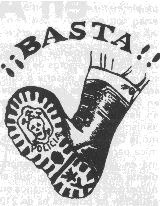Alex Constantine - March 29, 2008
Human rights violators and important witnesses disappear mysteriously
Murders, suspicious suicides, kidnapping, hundreds of death threats, concealment of witnesses and evidence. All are tools used by some ultra-right wing military officers with links to the 1976-83 Argentine dictatorship. They are trying to obstruct justice in human rights trials, hoping to escape without a conviction.
Eighteen months have passed since the disappearance of Jorge Julio López, a key witness in the trial of former Buenos Aires police chief Miguel Etchecolatz, who was sentenced to life in prison in 2006 for running 20 death camps, and now the murder of an officer in a navy prison, the suspicious suicide of another officer in an air force hotel and numerous death threats seem to show that human right violators keep a powerful network active.
“It’s terrorizing what is happening, and you have to look at the big picture: in a prison they took a former police chief — a murderer — out for a walk because they said he was depressed,” said Claudio Pandolfi, a lawyer for two victims of dictatorship-era police repression. “No one ever knew anything about López; the Navy poisoned one of its own, and now there is a ‘suicide’ in a military hotel. It seems these people are’nt be afraid at all of democracy or official discourse.”
Pandolfi and human rights organizations now say they are worried about recent reports that similar events are taking place. The issue has even become an important issue for President Cristina Fernández, whose government and that of her husband, Néstor Kirchner (2003-2007), have had a clear stance against human rights violations.
Macabre message
On Dec. 10 of last year, Héctor Febres, a former prefect of Argentina’s coastguards and one of the most sadistic repressors of the dictatorship, who was a central figure in the trafficking of newborn babies in detention centers, was found poisoned with cyanide.
It was too strange to be a coincidence, many said; it was the day Cristina Fernández took office.
On more than one occasion Febres had told his relatives that he felt abandoned by his fellow comrades. This led for them to fear that when the time came on Dec. 13 for him to testify in the baby trafficking case, he could mention the names of other officers, implicating them in this and other crimes. Instead, he died three days before.
“For fear of incriminating his buddies, their jailers opted to give Febres a special treatment: he wasn’t off by himself in a cell but in an apartment with a cell with a, mobile telephone, two computers, a television and VCR. There are photos of him and his wife summering in an Atlantic coast beach,” said Estela de Carlotto, president of the Grandmothers of the Plaza de Mayo rights organization.
Less than three months later, on Feb. 25, Army Lt. Col. Paul Alberto Navone, a former intelligence agent, was found dead in an air force hotel in the Cordoba province. Like Febres, he was scheduled to testify three days after his death, also in a trial for baby-trafficking in a military hospital in interior Argentina. Authorities are still investigating his death.
http://www.latinamericapress.org/article.asp?lanCode=1&artCode=5555










The fascist psychos kill off the parents steal the children in an adoption ring, and then sell them off to the new parents; OKed by the fascist murderers or friends of theirs